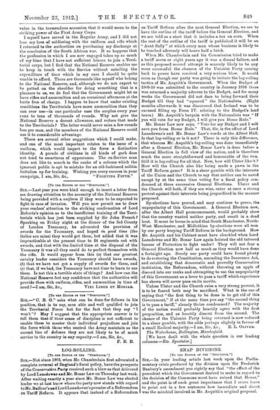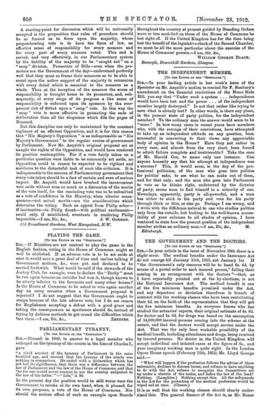SNAP DIVISIONS.
[To THE EDITOR OP TH1 "SPECTATOR.n Six,—In your leading article last week upon the Parlia- mentary crisis produced by the division upon Sir Frederick Banbury's amendment you rightly say that "the effect of the precedent which the Government desired to make in regard to the decision of the Commons must have ruined that House," and the point is of such great importance that I crave leave to point out in a few sentences how immediate and direct was the mischief involved in Mr. Asquith's original proposaL A starting-point for discussion which will be universally accepted is the proposition that rules of procedure should be so framed as to force upon the majority, whose preponderating vote is to have the force of law, an effective sense of responsibility for every measure and for every part of every measure voted. This end is served, and very effectively, in our Parliamentary system by the liability of the majority to be " caught out " on a " snap " division. Promoters of Bills—even when the pro- moters are the Government of the day—understand perfectly well that they must so frame their measures as to be able to count upon the active support of the majority in connexion with every detail which is essential to the measure as a whole. Thus at the inception of the measure the sense of responsibility is brought home to its promoters, and, sub- sequently, at every stage of its progress a like sense of responsibility is enforced upon its sponsors by the ever- present risk of defeat upon a " snap" vote. In this way the " snap " vote is more effective in promoting the ends of deliberation than all the eloquence which fills the pages of Hansard.
But this discipline can only be maintained by the constant vigilance of an efficient Opposition, and it is for this reason that " His Majesty's Opposition " is as indispensable as " His Majesty's Government " to the regular course of government by Parliament. Now Mr. Asquith's original proposal set at naught the rights of the Opposition, and would have rendered its position contemptible. For if a vote fairly taken on a particular question were liable to be summarily set aside, no Opposition could in reason be expected to be vigilant and assiduous to the distasteful task of such idle criticism. It is indispensable to the success of Parliamentary government that every vote taken should be a fact of certain and even of serious import. Mr. Asquith would have brushed the inconvenient vote aside without even so much as a discussion of the merits of the vote itself, for the rescinding vote was to be submitted as a vote of confidence in the Ministry, when ulterior conse- quences—not actual merits—are the considerations which determine the voting. Such an appeal from Philip sober— if inattentive—to Philip drunk—with political excitement— could only, if established, eventuate in rendering Philip















































 Previous page
Previous page